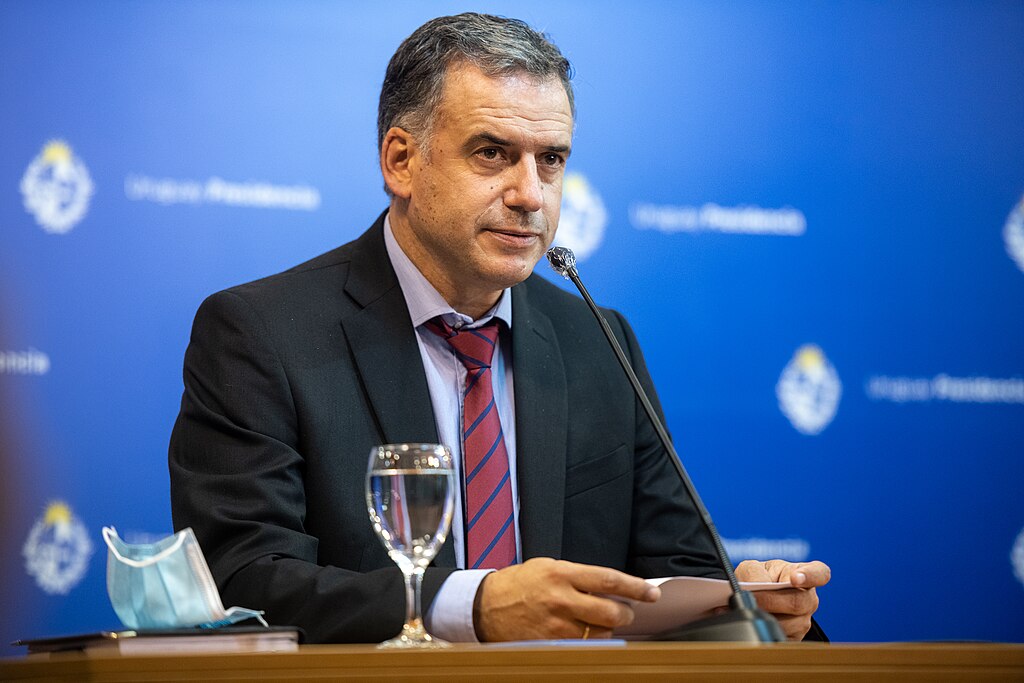In a significant political shift, Yamandú Orsi of the leftist Broad Front coalition has won Uruguay’s presidency in a tightly contested runoff election. The victory marks the return of the Broad Front to power after five years of center-right governance under President Luis Lacalle Pou.
Orsi, a former history teacher and two-time mayor of Canelones, defeated Álvaro Delgado of the National Party, securing 49.8% of the vote compared to Delgado's 45.9%. With nearly all ballots counted, Orsi's win signals a new chapter in Uruguayan politics.
A Broad Front Revival After Five Years
The Broad Front’s return to power follows a one-term hiatus after dominating Uruguay's political landscape for 15 years. Under the coalition’s previous administrations, the nation saw transformative reforms, including the legalization of gay marriage and marijuana and significant poverty reduction.
Delgado, Lacalle Pou’s political ally, conceded defeat on Sunday night, describing the loss as “bittersweet.” Despite his disappointment, he expressed optimism about the National Party’s future. “We are not defeated,” Delgado told supporters. Lacalle Pou also congratulated Orsi and pledged to ensure a smooth transition of power.
Orsi will take office on March 1, 2025, alongside his running mate Carolina Cosse, a prominent engineer and the governor of Montevideo. Together, they have pledged to address pressing national issues, including poverty, crime, and economic revitalization.
Orsi’s Moderate Approach Inspires Hope
Orsi’s campaign emphasized unity and pragmatism, drawing inspiration from former President José “Pepe” Mujica, a widely admired leader who governed Uruguay from 2010 to 2015. Mujica’s administration is credited with groundbreaking social reforms and economic stability, setting the stage for Orsi’s moderate yet progressive platform.
In his victory speech, Orsi emphasized national unity and a focus on creating a “more integrated society.” His administration aims to prioritize initiatives such as revitalizing agriculture, offering tax incentives to attract investment, and enhancing public security. Analysts note that his platform reflects a balanced blend of social welfare and market-friendly policies.
Supporters celebrated the win in Montevideo, where Orsi addressed the nation, saying, “The country of liberty, equality, and fraternity has triumphed once again.”
Challenges Await Orsi’s Leadership
Despite the celebrations, Orsi faces significant challenges. Childhood poverty has risen to 25%, and organized crime has surged, presenting immediate concerns for the incoming administration. Additionally, Orsi has indicated plans to reassess Uruguay’s trade agreement with China, a move that could impact the country’s standing within the Mercosur trade bloc.
Orsi also inherits a nation grappling with rising inequality and public discontent over crime. However, his emphasis on national dialogue and inclusive governance offers a promising path forward.
Netizens React to Orsi’s Win
Orsi’s victory sparked widespread reactions on social media. Here’s how users on X (formerly Twitter) responded:
- @GlobalViewpoint: “A historic day for Uruguay. Orsi’s leadership will be a test of unity and progress!”
- @UruguayPulse: “Delgado’s defeat shows the need for better campaigns, not just criticisms of the opposition.”
- @BroadFrontFan: “Mujica’s legacy lives on! Orsi has big shoes to fill, but we’re hopeful.”
- @PolicyWatchLatAm: “Can Orsi address Uruguay’s rising crime rates? The pressure is on!”
- @CriticCornerUru: “Great win for Orsi, but tackling poverty and crime will be his biggest challenges.”
- @UnityForUruguay: “Finally, a leader who focuses on dialogue and progress. Congrats, President Orsi!”



 Dominican Republic Unveils Massive Rare Earth Deposits to Boost High-Tech and Energy Sectors
Dominican Republic Unveils Massive Rare Earth Deposits to Boost High-Tech and Energy Sectors  USITC to Review Impact of Revoking China’s PNTR Status, Potentially Raising Tariffs on Chinese Imports
USITC to Review Impact of Revoking China’s PNTR Status, Potentially Raising Tariffs on Chinese Imports  Trump Media Weighs Truth Social Spin-Off Amid $6B Fusion Energy Pivot
Trump Media Weighs Truth Social Spin-Off Amid $6B Fusion Energy Pivot  Trump to Address Nation as U.S. Launches Strikes in Iran, Axios Reports
Trump to Address Nation as U.S. Launches Strikes in Iran, Axios Reports  Pakistan-Afghanistan Tensions Escalate as Taliban Offer Talks After Airstrikes
Pakistan-Afghanistan Tensions Escalate as Taliban Offer Talks After Airstrikes  Trump Floats “Friendly Takeover” of Cuba as Rubio Reportedly Engages in Talks
Trump Floats “Friendly Takeover” of Cuba as Rubio Reportedly Engages in Talks  Denver Mayor Orders Police to Protect Protesters, Restricts ICE Access to City Property
Denver Mayor Orders Police to Protect Protesters, Restricts ICE Access to City Property  Argentina Senate Approves Bill to Lower Age of Criminal Responsibility to 14
Argentina Senate Approves Bill to Lower Age of Criminal Responsibility to 14  Macron Urges Emergency UN Security Council Meeting as US-Israel Strikes on Iran Escalate Middle East Tensions
Macron Urges Emergency UN Security Council Meeting as US-Israel Strikes on Iran Escalate Middle East Tensions  Germany and China Reaffirm Open Trade and Strategic Partnership in Landmark Beijing Visit
Germany and China Reaffirm Open Trade and Strategic Partnership in Landmark Beijing Visit  Australian PM Calls Alleged Western Australia Terror Plot “Deeply Shocking” After Arrest
Australian PM Calls Alleged Western Australia Terror Plot “Deeply Shocking” After Arrest  U.S.-Iran Nuclear Talks Show Progress but No Breakthrough Amid Rising Military Tensions
U.S.-Iran Nuclear Talks Show Progress but No Breakthrough Amid Rising Military Tensions  Trump Orders Federal Agencies to Halt Use of Anthropic AI Technology
Trump Orders Federal Agencies to Halt Use of Anthropic AI Technology  Federal Judge Blocks Virginia Social Media Age Verification Law Over First Amendment Concerns
Federal Judge Blocks Virginia Social Media Age Verification Law Over First Amendment Concerns  ICE Hiring Surge Raises Vetting Concerns Amid Rapid Expansion
ICE Hiring Surge Raises Vetting Concerns Amid Rapid Expansion  NYC Mayor Zohran Mamdani Meets President Trump to Tackle Housing Crisis and ICE Detentions
NYC Mayor Zohran Mamdani Meets President Trump to Tackle Housing Crisis and ICE Detentions  Israel Declares State of Emergency as Iran Launches Missile Attacks
Israel Declares State of Emergency as Iran Launches Missile Attacks 































